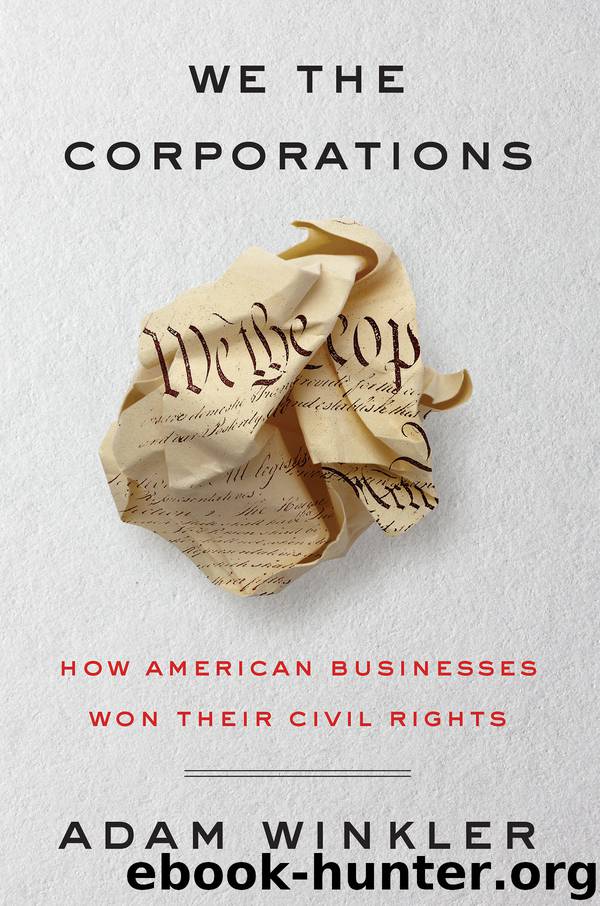We the Corporations by Adam Winkler

Author:Adam Winkler
Language: eng
Format: epub
Publisher: Liveright
THE JUSTICES OF THE SUPREME COURT WHO DECIDED THE LOUISIANA NEWSPAPERS CASE. STANDING, LEFT TO RIGHT: OWEN ROBERTS, PIERCE BUTLER, HARLAN STONE, BENJAMIN CARDOZO. SITTING, LEFT TO RIGHT: LOUIS BRANDEIS, WILLIS VAN DEVANTER, CHARLES EVANS HUGHES, JAMES MCREYNOLDS, GEORGE SUTHERLAND.
The Horsemen, led by Sutherland, a native Englishman who grew up in the wilds of Utah Territory in the 1870s, agreed the law was unconstitutional but argued instead that the problem was one of business taxation. Louisiana could tax all newspapers or no newspapers but could not only tax those newspapers with circulation in excess of 20,000. Regardless of whether Long and lawmakers sought to stifle opponents, a tax law could not arbitrarily apply only to a subset of businesses. Such discriminatory taxes, in the view of the Horsemen, were a way for the government to choose winners and losers in the marketplace. As Sutherland had written in a previous case, differential rates of taxation were “a mere subterfuge by which the members of one group of taxpayers are unequally burdened for the benefit of the members of other groups similarly circumstanced.” For the Musketeers, who believed government was within its powers to set different tax rates, the Louisiana law burdened liberty and interfered with democracy. For the Horsemen, the law burdened business and interfered with the free market.37
Sutherland was assigned to write the majority opinion, which prompted Cardozo to draft a concurrence emphasizing the civil liberties aspect of the case. Cardozo’s concurring opinion was so powerful, Sutherland found the justices gravitating away from his own argument. Instead of allowing Cardozo to steal away his majority opinion, Sutherland agreed to revise his own opinion to give more weight to the freedom of the press.
In February of 1936, as Americans were being reminded of the dangers of political persecution in newspaper stories about athletes marching past Adolf Hitler at the winter Olympics, the Supreme Court issued its opinion in Grosjean v. American Press Company. Sutherland’s opinion integrated concerns about taxation and political persecution: “The form in which the tax is imposed is in itself suspicious,” Sutherland wrote. The “plain purpose” of the tax was “penalizing the publishers and curtailing the circulation of a select group of newspapers.” Once again, the government was picking winners and losers. Yet, due to Cardozo’s influence, Sutherland also portrayed the case as one about persecution and democracy.38
“For more than a century prior to the adoption of the [First] amendment—and, indeed, for many years thereafter,” Sutherland’s opinion explained, “history discloses a persistent effort on the part of the British government to prevent or abridge the free expression of any opinion which seemed to criticize or exhibit in an unfavorable light, however truly, the agencies and operations of the government.” The advertising tax was “a deliberate and calculated device in the guise of a tax to limit the circulation of information to which the public is entitled in virtue of the constitutional guaranties.” Echoing the argument of Manship and the Louisiana dailies, Sutherland recognized the special role the press
Download
This site does not store any files on its server. We only index and link to content provided by other sites. Please contact the content providers to delete copyright contents if any and email us, we'll remove relevant links or contents immediately.
Day by Elie Wiesel(2775)
The Age of Genius by A. C. Grayling(2570)
Gideon's Spies: The Secret History of the Mossad by Gordon Thomas(2329)
The Gulag Archipelago (Vintage Classics) by Aleksandr Solzhenitsyn(2078)
FATWA: Hunted in America by Pamela Geller(1993)
Columbine by Dave Cullen(1858)
Men Explain Things to Me by Rebecca Solnit(1716)
The Rule of Law by Bingham Tom(1679)
Anatomy of Injustice by Raymond Bonner(1653)
Examples & Explanations: Administrative Law by William F. Funk & Richard H. Seamon(1631)
Three Cups of Tea by Greg Mortenson(1606)
The Source by James A. Michener(1598)
That Every Man Be Armed by Stephen P. Halbrook(1575)
ADHD on Trial by Michael Gordon(1568)
Future Design by Unknown(1562)
Gideon's Spies by Gordon Thomas(1497)
Palestinian Walks by Raja Shehadeh(1493)
Constitutional Theory by Carl Schmitt(1443)
Nothing to Envy by Barbara Demick(1436)
